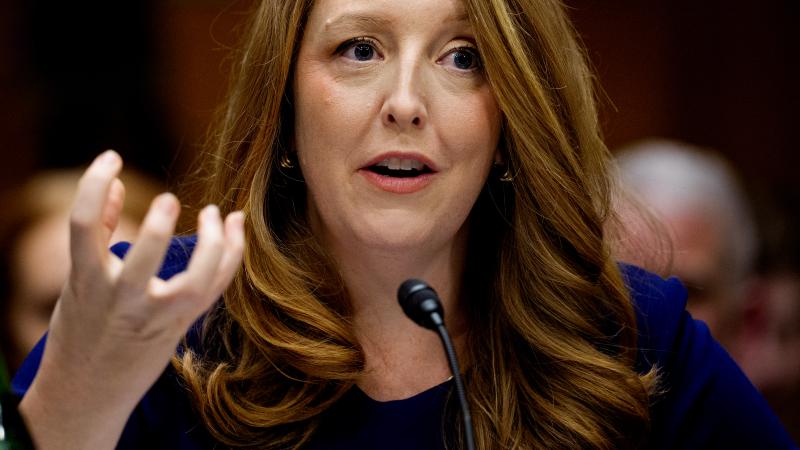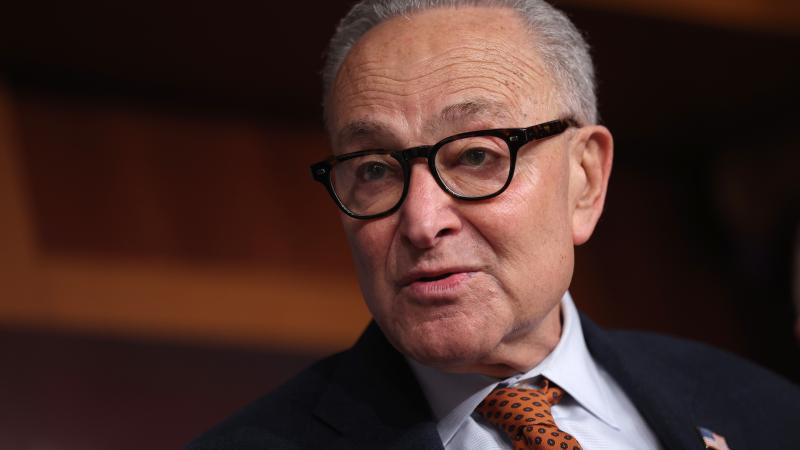In campaign homestretch, Biden's final pitch falling on deaf ears, polls indicate
Voters give the nod to Republicans to tackle inflation, even as Biden claims the GOP would make the economy worse.
Voters continue to trust Republicans more than Democrats to handle economic issues, according to recent polling, despite President Biden warning, in what he dubbed his "closing argument" ahead of the midterm elections, that GOP policies would worsen inflation and the broader economy.
The striking gap between Biden's rhetoric and voters' thinking comes as inflation continues to soar at its fastest rate in four decades and pollsters project a strong showing for Republicans on Election Day.
Many Democrats campaigning for the midterms had been focusing primarily on abortion, an issue on which polling indicates they enjoy greater support than the economy. But Biden himself pivoted hard over the last week toward economic issues. Delivering to the Democratic faithful his "closing argument about what we need to do ... to make a victory assured," the president framed the election as a stark choice between two different visions for the country.
"Democrats are building a better America for everyone with an economy that grows from the bottom up and the middle out, where everyone does well," Biden said at a Democratic National Committee event on Monday. "Republicans are doubling down on their mega MAGA trickle-down economics that benefits the very wealthy. It failed their country before and will fail it again if they win."
Biden echoed this message at several fundraisers and other events this week, arguing his policies have put the economy in a good place.
"Economic growth is up, the price of inflation is down, real incomes are up, and the price of gas is down," Biden said Thursday in Syracuse, N.Y. "The American people are seeing the benefits of this economy that works for them."
Biden especially touted the Inflation Reduction Act, the massive Democrat spending and tax bill he signed into law in August, despite experts concluding the legislation won't actually reduce inflation.
Still, Biden attacked Republicans for wanting to repeal the legislative package, describing their economic proposals as "reckless" for allegedly adding to the deficit and providing tax cuts to the wealthy.
"I would argue it's reckless and irresponsible, and it will make inflation worse if they succeed," said Biden, who added his economic plan is a "fundamental shift" that's "working compared to what the very conservative Republicans are offering these days."
Voters seem to disagree, however.
Recent polling continues to show voters prefer Republicans over Democrats by double-digit margins to handle inflation and the economy.
A new ABC News/Ipsos poll, for example, found 36% of Americans trust the GOP to address inflation compared to 21% who trust Democrats. On the economy more broadly, 36% trust Republicans to do a better job, while 24% trust Democrats.
Meanwhile, the latest CNBC All-America Economic survey showed 42% of Americans believe the Republican Party would do a better job at bringing down inflation, while only 27% think Democrats are the best party to do so. Republicans also had a double-digit lead on "creating jobs," "dealing with taxes," and "reducing the federal deficit," but slightly trailed Democrats when it came to "looking out for the middle class."
Voters also picked the GOP over Democrats by a comfortable margin to handle inflation and the economy in a recent Politico/Morning Consult poll.
These results build on polling over the last several months that's consistently shown voters trust Republicans more than Democrats to handle inflation and the economy, that these are the top issues for voters, and that a majority of Americans disapprove of Biden's handling of each.
Beyond polling, the latest economic news also doesn't bode well for Biden and the Democrats.
The Personal Consumption Expenditures Index (PCE), which measures prices paid by consumers for goods and services and is closely watched by the Federal Reserve, jumped 0.3% compared to last month and 6.2% for the year through September, according to the latest report released Friday by the Commerce Department.
After taking out food and energy, which can be volatile from month to month, the PCE increased by 5.1% over the past year, higher than the August rate of 4.9%.
Separately, the Labor Department on Friday released its Employment Cost Index, which showed wages and salaries for workers increased by 1.3% in the third quarter and 5.1% over the year ending in September. Higher wages can contribute to inflationary pressures by increasing consumer demand.
However, the spikes didn't keep up with the rate of inflation — real wages and salaries adjusted for inflation have declined by 3% over the year ending in September.
The result is rising prices and less take-home pay for Americans when accounting for those prices.
"'Borrowed time' is how I would describe the consumer right now," Tim Quinlan, a senior economist at Wells Fargo, told the New York Times. "Credit card borrowing is up, saving is down, our costs are rising faster than our paychecks are."
Meanwhile, government data released Thursday showed the economy grew 2.6% in the third quarter after two straight quarters of decline. Biden was quick to tout the news as a sign of his economic agenda's success.
"For months, doomsayers have been arguing that the U.S. economy is in a recession and congressional Republicans have been rooting for a downturn," he said in a statement. "But today we got further evidence that our economic recovery is continuing to power forward."
However, economists are expressing a gloomier forecast of the state of the economy.
"Ignore the headline number — growth rates are slowing," Michael Gapen, the chief U.S. economist for Bank of America, told the Times. "It wouldn't take much further slowing from here to tip the economy into a recession."
Others expressed similar concerns that a slowdown is coming.
"Going forward, growth could well turn negative in the fourth quarter and will likely be very weak over the next year," David Kelly, chief global strategist at JPMorgan Asset Management, wrote this week. "There is more braking power being inflicted on the U.S. economy than will be at all apparent in the third-quarter GDP report."
Meanwhile, the two most basic costs of living — food and shelter — continue to rise as multiple recent studies have found inflation will cost families thousands of dollars this year.
Against this economic backdrop, midterm election predictions are looking good for Republicans, with most pollsters predicting a GOP red wave in the House and a good chance of a GOP majority in the Senate.
One political forecaster, however, that wasn't necessarily predicting a Republican majority in the House was Sabato's Crystal Ball, a project of the University of Virginia's Center for Politics — until now. This week, the election handicapper for the first time rated 218 House races — the magic number needed for a majority — as safe, likely, or leaning Republican.
"After these changes, 218 seats at least Lean Republican, while 195 at least Lean Democratic, and there are 22 Toss-ups. Splitting the Toss-ups evenly, 11-11, would give Republicans 229 seats, or a net gain of 16," Kyle Kondik wrote this week. "We suspect the Republicans will do better than just a split in the Toss-ups, so our updated forecast is a GOP gain in the high teens or low 20s."
















